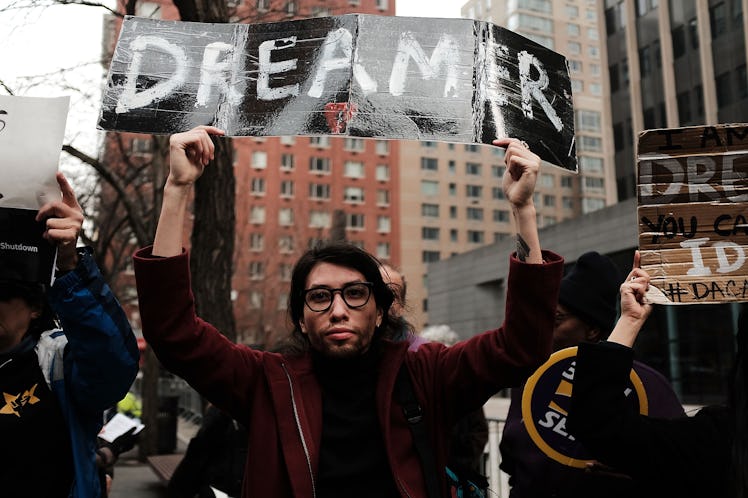
Dreamers Got A Major Win With The Newest Ruling On DACA
Ever since September 2017, when the U.S. Attorney General announced that an Obama-era immigration provision known as Deferred Action for Childhood Arrivals (DACA) would be rescinded, recipients of the program have remained totally in limbo. The latest update in the saga came on Tuesday, April 24, according to published reports, when a federal judge in Washington weighed in on the issue. What does the new DACA ruling mean? DACA recipients, or "Dreamers," just got a major win.
John D. Bates, a D.C. federal judge, ruled on Tuesday that the Department of Homeland Security (DHS) had failed to illustrate why the program was "unlawful," per The New York Times, and said that he would give the department 90 days to better explain its reasoning for cutting the program. If the DHS does not give a good enough explanation within 90 days, Bates ruled, they'll have to "accept and process new as well as renewal DACA applications," so Dreamers will keep their protections in the United States.
The DACA program, implemented under the Obama administration in 2012, protects people who were brought into the U.S. illegally as children by delaying deportation and offering them work permits. Bates is one of three judges in the last few months to rule against the Trump administration’s rescinding of DACA, per the Times. Federal judges in Brooklyn and in San Francisco each ruled that the program remain in place. Bates' decision sharply rebuked the DHS claim that DACA is "unlawful," he said, because that claim was left "virtually unexplained." Bates said,
Executive Branch officials possess relatively unconstrained authority to enforce the law against certain violators but not others. Ordinarily, the exercise of that authority is subject to review not in a court of law, but rather in the court of public opinion ... When an official claims that the law requires her to exercise her enforcement authority in a certain way, however, she excuses herself from this accountability.
The U.S. Justice Department released a statement on April 24, per CBS News, stating that the most recent ruling does not change its stance that DACA is illegal and must be rescinded, and that it will "continue to vigorously defend this position."
Several lawmakers were quick to tout this as a victory for Dreamers.
There still remains a partisan and ideological divide on DACA, despite Bates' decision. Right-wingers tend to believe that President Barack Obama reached beyond the scope of his authority when he created the program — despite the fact that it did have bipartisan support over the years, according to Vox. Some of the more extreme conservative responses on Twitter have been based on blatantly xenophobic and racist ways of thinking.
The Trump administration has certainly painted Obama's implementation of DACA as a kind of "unilateral executive amnesty." These kinds of claims often lump the DACA program — which applies to people ages 16 to 30 — with a more sweeping immigration policy. Attorney General Jeff Sessions said upon announcing the rollback in September 2017 that DACA had contributed to a "surge of minors at the southern border that yielded terrible humanitarian consequences" and denied jobs to American citizens.
As recent as Monday, April 23, Sessions referenced a similar xenophobic, fear-mongering argument about securing the U.S. southern border. “Pockets of the original, so-called ‘migrant caravan,’ which press reports indicate consists mostly of Honduran nationals, have begun to arrive at our southern border with the intent of claiming asylum. These individuals — and their smugglers — ignored the willingness of the Mexican government to allow them to stay in Mexico," he said in the statement. ThinkProgress reported that Sessions' "caravan" claim is grossly exaggerated. “Under no circumstances does the Mexican government promote illegal migration,” officials from the Mexico Foreign Ministry said in a statement earlier in April.
Clearly, two different pictures of DACA are being colored by differing political ideologies. The reality of DACA is much less vexing. A 2015 study at the University of California at Los Angeles (UCLA) assessed DACA’s impacts on the educational, socioeconomic, and health trajectories of young adults in Southern California — three years after DACA was implemented. The study found that DACA recipients had experienced some educational and economic gains, but still struggled to pay bills, access health insurance, and tended to work low-paying jobs.
"In addition, both DACA recipients and non-recipients report increased worry about the deportation of undocumented family members," the study reads. "Our findings suggest that existing policies related to health, education, employment, and immigration may not go far enough in meeting the needs of immigrant youth."
The DACA debate is a prime example of how disagreeing factions — Democrats and Republicans — often get so caught up in scoring a political "win" that the most directly-affected people still continue to struggle.